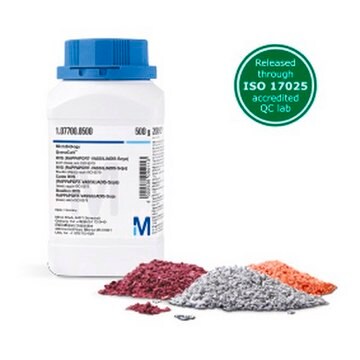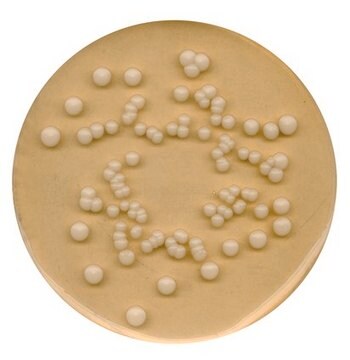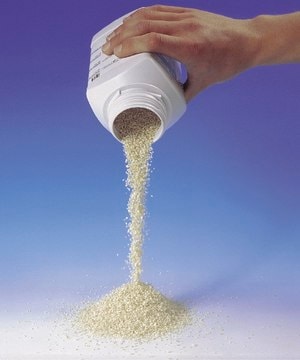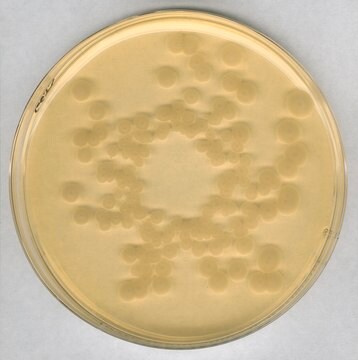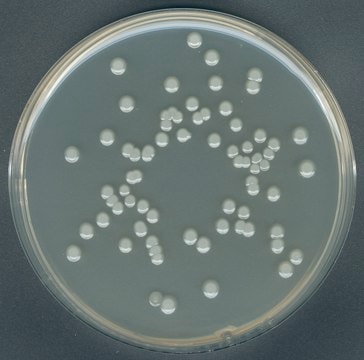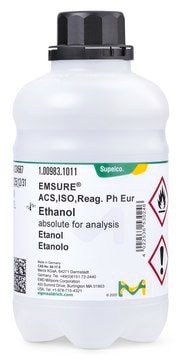1.05443
GranuCult® Nutrient Broth
acc. FDA-BAM, for general cultivation of less fastidious microorganisms
Synonym(s):
Nutrient Broth, Nutrient broth
Sign Into View Organizational & Contract Pricing
All Photos(1)
About This Item
UNSPSC Code:
41106213
NACRES:
NA.74
Recommended Products
Agency
FDA-BAM
Quality Level
sterility
non-sterile
Sterilization Compatibility
autoclavable compatible
form
granular
manufacturer/tradename
GranuCult® prime
technique(s)
microbiological culture: suitable
pH
7.0 (37 °C, 8 g/L in H2O, after autoclaving)
solubility
8 g/L
bulk density
470 kg/m3
application(s)
food and beverages
pharmaceutical
storage temp.
15-25°C
suitability
heterotrophic bacteria
General description
GranuCult® prime Nutrient Broth is a general-purpose liquid media used for the isolation and growth of less fastidious microorganisms. It consists of peptone from meat, meat extract, yeast extract and sodium chloride. All these provide the basic nutrient requirements for the cultivation of non-fastidious microbes. The media can be enriched on the addition of supplements like blood.
Application
GranuCult® Nutrient Broth is designed as a basic medium to support the growth of fastidious and non-fastidious microbes in test samples. It is an appropriate media for carrying out sub-culturing or to revive dormant strains.
Features and Benefits
- Safe and sustainable due to reduced risks associated with fine dust and toxic substance inhalation, resulting in a safer work environment
- Excellent wettability, solubility, and free flowing properties
- Convenient, with minimal component separation and clumping, even under warm or humid conditions
- High batch-to- batch reproducibility
- Prolonged shelf life of up to five years
- High number of test strains exceeding all regulatory demands
- Granulation technology allowing many supplements to be included, with no need to add these separately
Linkage
Replaces: 1.05443
Analysis Note
Appearance (clearness): clear
Appearance (color): yellowish to yellowish-brown
pH-value (25 °C): 6.6 - 7.0
Growth promotion test in accordance with the current version of DIN EN ISO 11133.
Inoculum on reference medium (Staphylococcus aureus ATCC 25923 (WDCM 00034)): ≤ 100
Inoculum on reference medium (Streptococcus pyogenes ATCC 12344): ≤ 100
Inoculum on reference medium (Listeria monocytogenes ATCC 19118): ≤ 100
Inoculum on reference medium (Bacillus cereus ATCC 11778 (WDCM 00001)): ≤ 100
Inoculum on reference medium (Escherichia coli ATCC 25922 (WDCM 00013)): ≤ 100
Inoculum on reference medium (Salmonella typhimurium ATCC 14028 (WDCM 00031)): ≤ 100
Inoculum on reference medium (Pseudomonas aeruginosa ATCC 27853 (WDCM 00025)): ≤ 100
Growth (Staphylococcus aureus ATCC 25923 (WDCM 00034)): fair to very good
Growth (Streptococcus pyogenes ATCC 12344): fair to very good
Growth (Listeria monocytogenes ATCC 19118): fair to very good
Growth (Bacillus cereus ATCC 11778 (WDCM 00001)): fair to very good
Growth (Escherichia coli ATCC 25922 (WDCM 00013)): fair to very good
Growth (Salmonella typhimurium ATCC 14028 (WDCM 00031)): fair to very good
Growth (Pseudomonas aeruginosa ATCC 27853 (WDCM 00025)): fair to very good
Incubation: 24 ± 2 hours at 37 ± 1 °C, aerobic
Reference media: Tryptic Soy Agar
Appearance (color): yellowish to yellowish-brown
pH-value (25 °C): 6.6 - 7.0
Growth promotion test in accordance with the current version of DIN EN ISO 11133.
Inoculum on reference medium (Staphylococcus aureus ATCC 25923 (WDCM 00034)): ≤ 100
Inoculum on reference medium (Streptococcus pyogenes ATCC 12344): ≤ 100
Inoculum on reference medium (Listeria monocytogenes ATCC 19118): ≤ 100
Inoculum on reference medium (Bacillus cereus ATCC 11778 (WDCM 00001)): ≤ 100
Inoculum on reference medium (Escherichia coli ATCC 25922 (WDCM 00013)): ≤ 100
Inoculum on reference medium (Salmonella typhimurium ATCC 14028 (WDCM 00031)): ≤ 100
Inoculum on reference medium (Pseudomonas aeruginosa ATCC 27853 (WDCM 00025)): ≤ 100
Growth (Staphylococcus aureus ATCC 25923 (WDCM 00034)): fair to very good
Growth (Streptococcus pyogenes ATCC 12344): fair to very good
Growth (Listeria monocytogenes ATCC 19118): fair to very good
Growth (Bacillus cereus ATCC 11778 (WDCM 00001)): fair to very good
Growth (Escherichia coli ATCC 25922 (WDCM 00013)): fair to very good
Growth (Salmonella typhimurium ATCC 14028 (WDCM 00031)): fair to very good
Growth (Pseudomonas aeruginosa ATCC 27853 (WDCM 00025)): fair to very good
Incubation: 24 ± 2 hours at 37 ± 1 °C, aerobic
Reference media: Tryptic Soy Agar
Footnote
We offer two media types: the superior granulated GranuCult® and the cost-efficient powdered NutriSelect® culture media, depending on your needs.
The designations basic, plus, or prime are added to indicate the quality control level, from basic quality control to standard QC plus to prime for full regulatory compliance.
The designations basic, plus, or prime are added to indicate the quality control level, from basic quality control to standard QC plus to prime for full regulatory compliance.
Legal Information
GRANUCULT is a registered trademark of Merck KGaA, Darmstadt, Germany
NutriSelect is a registered trademark of Merck KGaA, Darmstadt, Germany
Storage Class Code
11 - Combustible Solids
WGK
WGK 3
Certificates of Analysis (COA)
Search for Certificates of Analysis (COA) by entering the products Lot/Batch Number. Lot and Batch Numbers can be found on a product’s label following the words ‘Lot’ or ‘Batch’.
Already Own This Product?
Find documentation for the products that you have recently purchased in the Document Library.
Adriana Criste et al.
Molecules (Basel, Switzerland), 25(5) (2020-03-11)
Hippophae rhamnoides L. is an important source of natural antioxidant and antimicrobial agents. Phytochemical compounds, antioxidant and antibacterial properties of berries, and leaf extracts from four Romanian sea buckthorn cultivars were investigated. Large differences in the content of total polyphenols
Our team of scientists has experience in all areas of research including Life Science, Material Science, Chemical Synthesis, Chromatography, Analytical and many others.
Contact Technical Service